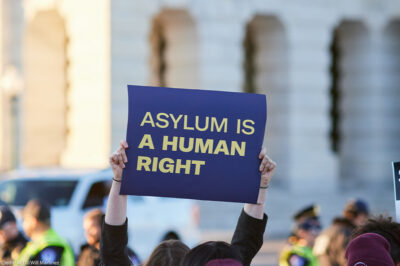A Federal Judge Denounced the ‘Egregious Conditions’ of Border Patrol Holding Cells: Will Anything Change?


Last week, Customs and Border Protection Commissioner Gil Kerlikowske visited a new Border Patrol “processing center” in South Texas’ Rio Grande Valley. He spoke to a detained mother and her 6-year-old twins, saying of such migrants:
“[Y]ou would have to have a heart of stone to not appreciate what they suffered and [what they’ve] been through, and why they come to this country.”
The commissioner did not, however, address a federal judge’s conclusions this summer that his Border Patrol “wholly failed” to ensure safe and sanitary custody conditions.
In July, Judge Dolly Gee of the federal district court in Los Angeles ruled that family detention of mothers and children by Immigration and Customs Enforcement violates the terms of a longstanding settlement agreed to by the federal government. The case originated more than three decades ago to address widespread mistreatment of detained immigrant children. Judge Gee’s order concluded that the government still hasn’t learned its lesson.
Importantly, in addition to ordering an end to ICE’s current family detention operations, the court’s opinion addresses conditions in Border Patrol detention facilities, the notorious “hieleras”—freezing cold cells that detainees are held in before being transferred to ICE or deported by CBP.
Speaking about the same Rio Grande Valley sector visited by Commissioner Kerlikowske, Judge Gee credited evidence of “widespread and deplorable conditions.” Border Patrol facilities were “overcrowded and unhygienic” and characterized by cold temperatures, an absence of blankets and trash cans, constant illumination, inadequate nutrition, and defective medical care. The agency insists these holding cells are meant to be short-term, but most detainees are held in these inhumane conditions for days on end, as the government’s own records show. The court ordered remedies to be implemented by October 23, 2015.
As the Flores case demonstrates, these problems are not new — the government has been aware of them for years. The commissioner himself acknowledged last summer that more than 100 complaints about custody conditions filed by the ACLU and allies on behalf of unaccompanied children were “absolutely spot-on.” Two samples from these complaints show how CBP’s neglect leads to dire and dangerous conditions:
- H.R., a seven-year-old boy who is severely developmentally disabled, suffered from acute malnourishment when he was apprehended, but CBP held him in custody for approximately five days without any medical treatment. He was eventually hospitalized and underwent emergency surgery.
- C.S., a 17-year-old girl, was detained in a freezing cell in wet clothes, which did not dry for three-and-a-half days due to the frigid temperature. The only drinking water available to her came from a toilet tank, and the bathroom was in plain view of all detainees with a security camera watching as well.
There’s been no response by CBP’s Internal Affairs office to these complaints. Just as disappointingly, CBP has issued no comprehensive custody standards or oversight plan to ensure that detention conditions are always safe and sanitary. DHS’s Office of Inspector General and the Government Accountability Office have both identified systemic problems with CBP’s custody oversight, yet the agency has failed to implement policies to ensure the humane treatment of detainees.
On June 8, 2015, a group of civil rights organizations filed a class action lawsuit, Doe v. Johnson, about unconstitutional detention conditions in Border Patrol’s Tucson sector. A full year after Commissioner Kerlikowske expressed concern about Border Patrol facilities, former and current detainees described men, women, and children being:
- packed into crowded cells for days at a time, with only concrete benches or the floor for a “bed”
- stripped of warm clothing and provided with only flimsy aluminum sheets that do not protect against the frigid temperatures
- denied soap, towels, and hygiene supplies, and prevented from showering or bathing
- held without medical care for serious injuries and illnesses.
We’re all for the commissioner’s personal visits to Border Patrol holding cells and recognize his evident concern for the adults and children CBP confines. We just wish he’d implement real detention standards with meaningful, independent oversight to guarantee safe and sanitary conditions there. It shouldn’t take years of complaints, reports, and lawsuits for CBP to begin taking seriously basic requirements of the Constitution, American values, and human decency.




